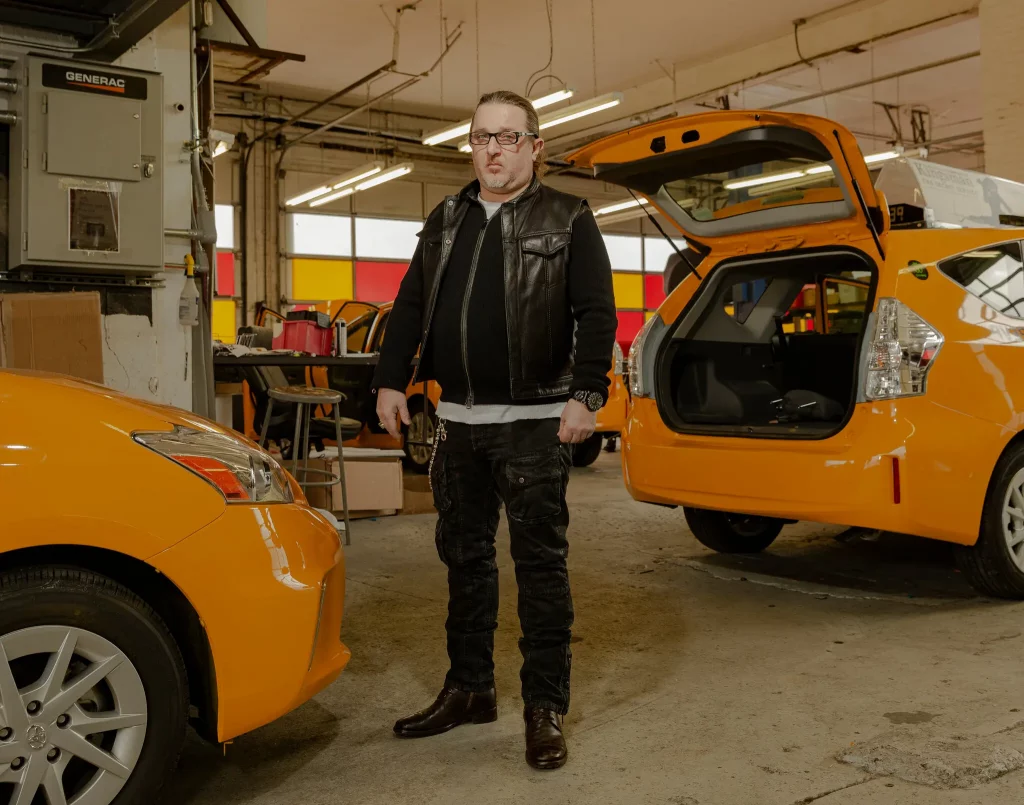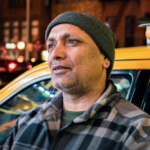
He bid up the price of medallions and borrowed against them. When their value plummeted, immigrant cabbies were left deep in debt.
Gene Freidman, a cabdriver’s son who schemed his way to become the nation’s biggest taxi mogul and came to personify both the inflated ascent of the industry in New York City and its crushing financial collapse, died on Sunday in Manhattan. He was 50.
His death, in a Manhattan hospital, apparently from complications of a heart attack, was confirmed by the Riverside Memorial Chapel funeral home.
Mr. Freidman, who emigrated from the Soviet Union with his parents in 1976, was widely known as the swashbuckling “Taxi King” and just as widely regarded as a piratical entrepreneur who did for the cab industry early in the 21st century what greedy lenders did for the nation’s savings and loan associations at the end of the 20th.
“He hurt so many people in so many different ways,” David Pollack, the former head of the Committee for Taxi Safety, an association of fleet owners that once included Mr. Freidman, told The New York Times in 2019. “Your headline could be ‘The man who brought down the taxi industry.’”
Mr. Freidman, a lawyer by training, was once flush with $525 million in assets, personally owning 250 taxi medallions worth $1.3 million each, a 4,000-square-foot townhouse off Park Avenue in Manhattan, an estate in Bridgehampton, N.Y., two villas on the French Riviera and a $400,000 Ferrari.
“Every day that I wake up, you know, I’m like, this is great,” he said in 2015. “You know, I live on Park Avenue, got a bunch of, like, Ferraris that I drive. I have a house in the south of France. I can have breakfast, like, at Cipriani. And it’s like, you know, pinch me. Is this real? I’m fresh off the boat!”
But within the past five years or so he wound up being disbarred in New York, evicted from the headquarters of his cab empire for owing $170,000 in back rent in 2017 — the same year that the city’s taxi commission refused to renew hundreds of his licenses — and legally bankrupt.
That was in addition to being ordered to pay $250,000 in fines, damages and restitution in 2016 for failing to abide by an agreement with the state attorney general’s office and the Taxi and Limousine Commission to pay fines and reimburse drivers for excessive charges.
In 2017, Mr. Freidman and Andreea Dumitru, the chief financial officer of his company, Taxi Club Management, were charged with first-degree tax fraud for failing to forward the 50-cent surcharge on each taxi ride that is supposed to be allocated to the Metropolitan Transportation Authority. They were accused of bilking the transit agency of $5 million.
In 2018, Mr. Freidman pleaded guilty to one count of criminal tax fraud and agreed to pay the state $1 million. He was sentenced to probation.
“I’m trying to be remorseful and understanding for anybody I might have harmed,” he told the judge. “I’m very humbled by what has happened.”
While his business partners lost millions because of his tax fraud, Mr. Freidman avoided prison by cooperating with a federal investigation into one of his partners, Michael Cohen, who gained notoriety as former President Donald J. Trump’s personal lawyer.
Mr. Freidman had managed Mr. Cohen’s medallions. When Mr. Freidman was divorcing his wife, Sandra, Mr. Cohen found him an apartment in Trump Tower on Fifth Avenue. (Mr. Freidman and his wife had a son and a daughter; complete information on his survivors was not available.)
While regulatory agencies stood by, Mr. Freidman and his confederates artificially inflated the price of the medallions required for yellow cabs and steered drivers to buy them. The drivers, most of them immigrants, took out loans, which they could not afford to repay when the value of the medallions dropped by half because of, among other things, competition from ride services like Uber and Lyft.
Medallions that the drivers had bought for more than $1 million plunged in price to as low as $350,000.
Earlier, though, when competitive bidding for medallions pushed the price higher, Mr. Freidman had been able to use the inflated value as collateral to borrow against and invest in taxi companies in Chicago and Philadelphia, in commercial properties elsewhere and in a chain of whimsical stores selling pajamas and beach wear.
“I’d go to an auction, I’d run up the price of a medallion, then I’d run to my bankers and say, ‘Look how high the medallions priced! Let me borrow against my portfolio,’” he told The Times. “And they let me do that.”
Ira Goldstein, a former chief of staff at the city’s taxi commission, which oversees the industry, said of Mr. Freidman: “He changed the market. People copied him, and it affected everybody, including the driver-owners.”
Evgeny Alender Freidman, known as Gene, was born on Nov. 29, 1970, in Leningrad (now St. Petersburg), in the Soviet Union. Emigrating in 1976, the family settled in the Jackson Heights area of Queens. He said that his father, Naum, had been a thermonuclear engineer back home but that in New York he became a cabdriver and eventually ran a garage with a fleet of taxis.
Gene graduated from the Bronx High School of Science, then earned a Bachelor of Science degree in 1992 from Skidmore College in Saratoga Springs, N.Y. (after being suspended for one semester for overdue parking tickets). He received a law degree from the Cardozo School of Law at Yeshiva University.
After college, he worked as a lawyer for a production company in Los Angeles. But he came to realize, he said, that while he and an accountant were doing all the work, the firm’s executives were gadding about the Caribbean.
“I needed to figure out how to make money,” Mr. Freidman recalled in a speech to the Sy Syms School of Business at Yeshiva in 2012.
He returned to the Soviet Union to represent a private investor. But in 1996 he doubled back to New York after his father had a heart attack.
If his pony tail suggested a degree of permissiveness, the middle finger protruding in the snow globe on his desk did not.
“I walked in and took over,” he said. “I told my dad, ‘I’m in, you’re out.’”
Over 15 years, the son expanded his father’s fleet from 60 to more than 900 of the city’s 13,587 medallions and drove up the company’s valuation from $2.5 million to $120 million. He personally owned about 250 medallions. At the height of the market each was worth $1.3 million, although many were mortgaged.
Most of the 900 medallions he managed were owned by others, to whom he paid a fee for the right to operate their cabs and keep the profits. He grappled with the administration of Mayor Michael R. Bloomberg over competition from newly introduced green cabs, designated expressly for passengers in underserved neighborhoods.
Notoriously litigious, Mr. Freidman sued the city over its proposal to eventually replace all cabs with Nissan’s so-called Taxi of Tomorrow — boxy vehicles with sliding doors and room for four passengers. Mr. Freidman contended that they were neither fuel-efficient hybrids nor wheelchair accessible.
He raised some $50,000 for the 2013 mayoral campaign of Bill de Blasio, under whose administration he fared somewhat better.
Despite his financial troubles, Mr. Freidman was hardly destitute in recent years. Testimony and evidence during legal proceedings revealed that he had squirreled away millions of dollars in bank accounts abroad.
Sam Roberts, an obituaries reporter, was previously The Times’s urban affairs correspondent and is the host of “The New York Times Close Up,” a weekly news and interview program on CUNY-TV. @samrob12







Bey Bey Mr Freidman,All that is on earth will perish, the essence of your Lord, the Master of glory, splendour and the Master of bounty and honour, will remain.
Corruption always remains the broken bridge for hope . Did taxi of tomorrow really work? Rideshare app showed up and wiped all the money overnight. Bey Freidman.